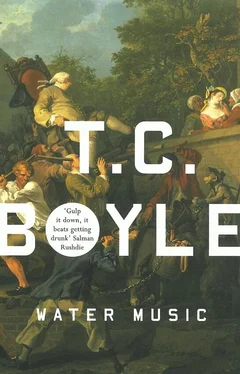Ned waited. He could count eighteen of them now, including a pair of children. The musicians — four grizzled, splay-footed homuncuh with nose flutes — kept up their piping, and the hidden drummer flailed at his hides. The whole troop was swaying to the music, and Ned, despite a nagging throb in his elbow, continued to clap along. It was at this point that one of the men separated himself from the others and began to make his way forward, feet shuffling in the dirt, head and shoulders undulating to the insistent pulse of the rhythm. He clutched a tiny bow to his breast — it looked like a toy — and wore a quiver looped over his shoulder. His nipples were dark rosettes, scarred from some ancient mishap — fire? war? rites of initiation? — clavicle and ribs protruded, his pubic hair was a snarl of white wire from which the rutted gray penis hung like a badge. An aureole of canescent hair fanned out round his head, and his jaws collapsed on toothless gums: he could have been the first man on earth, father of us all. Ned studied his face, trying to gauge the appropriate response, but the patriarch’s expression was blank.
They were singing now, all of them, a bizarre high-pitched whining interspersed with clicks and grunts. For the first time Ned began to feel apprehensive — maybe they weren’t so harmless after all. And then he saw it. Something glinting in the old man’s hand: a knife? a gun? Was this it, was this what he’d been saved for? But then suddenly he knew what that refulgent, fight-gathering object was, knew why they were offering it to him, knew what he would do and how he would survive. All at once he could see into the future He was no outcast, no criminal, no orphan — he was a messiah.
The old man handed him the clarinet. It was still damp from its soaking but the pads were clear, the keys undamaged. The drum thumped, the flutes skirled. He put it to his lips — they were smiling now, ranged round him like precocious children — he put it to his lips, and played.
♦ ♦ ♦
The years peeled back like the skin of an onion, layer on top of layer. Beau Brummell fled to Calais in disgrace, De Quincey swallowed opium. Sir Joseph Banks and George III gave up the ghost. There were riots in Manchester, Portugal and Greece. Beethoven went deaf. Napoleon fell and rose and fell again. Sir Walter Scott was shattered by the crash of 1826. Feathered bonnets came back into fashion and furbelows were all the rage. The Niger remained a mystery.
War, peace, Hapsburg, Hanover, décolleté bodices and cotton chemisettes, the fall of an empire, the restoration of a dynasty, Metternich, Byron, Beethoven, Keats — all of it passed Ailie by. She might as well have been living in another world. From the moment she succumbed to Georgie Gleg and had her hellish vision on the breast of Loch Ness, she was a changed woman. The vision — was it a vision? — had come as a warning, as a castigation. She had gone too far. Jealous and bitter, rebelling against the terrible emptiness of the camp follower’s life, she had turned her back on Mungo in his time of need. She was an adulteress, an apostate, she was a sinner.
She spent the rest of her life making up for it. When she got home to Selkirk she set up the shrine in the parlor and gathered the children around to inculcate the legend of the father they hardly knew. He was a hero, she told them, one of the greatest men Scotland had ever seen, a man who faced danger in the way ordinary people sat down to breakfast. Where was he? they asked. In Africa, she told them. When will he be coming home? Soon, she said.
This was her penance. The shrine, the legend, the burden of raising the children alone. Gifts would come for her from Edinburgh: combs, dresses, perfumes, toys for the children. She returned them unused. Gleg sent letter after letter. She never answered them. And when he came to the door, the hurt and anguish ironed into his face, the servant girl turned him away. What have I done? he shouted at the windows, over and over. What have I done? he shouted, till her father threatened to call the constable.
The children grew. Her father died. She spent hours at the window, looking out across the hills, waiting, hoping. And when she felt blackest, when she knew in her heart she’d never see either Mungo or Zander again, that’s when the fresh rumor would whisper in her ear, that’s when some trader would appear in Edinburgh with a story he had from a factor on the Gambia who had it from a native slaver who had it from a Mandingo priest: there was a white man in the Sahel, humble, saintly, living like a black. And it would start all over again. He was out there, she knew it.
Meanwhile, there were the children. Thomas, child of the century, was both a curse and a consolation. Like his father he was physically precocious, an athlete, the best footballer in Selkirkshire by the time he was fourteen. Tall, heavy in the chest and shoulders, hair like sand, he was the image of Mungo. She looked at him, and the past rose to haunt her like some sad unmentionable thing risen from the depths of a cold, dark loch. Mungo junior and Archie were like their father too — especially in the cast of their eyes — but Thomas was an exact replica, the hammered shape, the cast die. And more than any of the others he nurtured the legend of his father, pored over the books and maps in the explorer’s library, repeated the litany of the rumors until the words were cut like glass.
By 1827 Ailie was in her early fifties, a tiny woman, prematurely aged, worn down by the accumulation of fruitless hours and the futility of her life: it was twenty-two years since she’d laid eyes on her husband. Her daughter was married, Archibald was off in the army, Mungo junior had succumbed to the wanderlust — dead of the fever in India, where he’d been sent with his regiment. Thomas never married. He lived on in Selkirk, close to his mother, sharing with her the onus of his father’s disappearance, fostering the hope that he would one day return, hoary and triumphant, from the windswept hills, from the dunes and the jungles.
It was a cold clear morning in early autumn when he left. He had made his plans in secret, seeing no reason to alarm his mother. When she found him gone, she knew precisely what had happened: husband, brother, son. He wrote her from Accra, on the Gold Coast. It was simple, he had it all figured out. He would travel alone, as his father had done on the first expedition, living like the natives, making his way northeast through Ashanti-land and Ibo, striking the Niger at Boussa. The harmattans were blowing. Conditions were perfect. As soon as he could engage a guide he’d be on his way.
She studied the seal of the letter before she opened it. There was hardly any reason to read it: she knew what it said, could have written it herself. She was fifty-three. Mrs. Mungo Park. It was almost funny.
She sat by the window a long while, the envelope heavy in her hand, a pale alien light blanching the shrubs, the rooftops, the trees, until even the distant hills were drained of color and life. On the shelf behind her, oiled and black, sat the ebony figurine: gravid, obscene, another artifact.
There were no more letters.
[1] A sort of tobacco made from the cured leaves of the hemp plant. Cannabis sativa, which the natives smoke in order to enhance sexual performance and induce dreams.
[2] Chief magistrate of a town or province, responsible for overseeing the communal granary. He is instantly recognizable as the fat man in a cluster of ambulatory sticks.
[3] Land of the hon-kees .
[4] Free Mandingoes, generally Muslim converts, whose stockin-trade is human flesh.
[5] The transcript of the official proceedings against the former colonel charged him with eighteen counts of conduct unbecoming an officer, including “the serving of tea to his staff while dressed in a lady’s taffeta gown” and “the compelling of eight privates, under penalty of court-martial, to rub down his naked body with dustmops while continuously rehearsing the phrase: ‘O, I am a lowly snake in the grass, depraved and despicable.’ “












